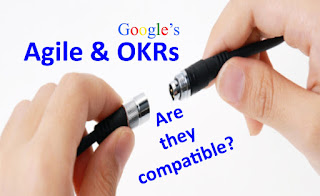A collaboration by JP Beaudry and Mario Moreira
Recently, someone asked us if we thought that the Objectives and Key Results (OKRs) used at Google and applied at Intel in the 1970s is compatible with the Agile mindset. In order to refresh our understanding of OKRs, we reviewed the Rick Klau presentation on How Google sets goals: OKRs. After examining the characteristics of OKRs, and with a few open questions, we are of the opinion that for the most part, they can be used in support of the Agile mindset.
To provide a basic understanding, OKRs is a technique for setting and
communicating goals. The first part, the objective, is the outcome that is
sought. While the second part, the key results, is comprised of 3 to 5 specific
and measurable pieces of evidence of progress against the objective. OKRs can
be cascaded and refined at various levels in an organization. In order to allow
people to be bold and think big, the guidance is that only about two thirds of
OKRs be completed within a given period of time. To promote transparency,
everyone’s OKRs are publicly accessible and graded.
Now back to the key question – Are OKRs compatible with Agile? Based on our examination of OKRs, here are some
reflections:
Measurable - Measurable outcomes are critical in determining whether one is getting closer to the stated objective. This is well aligned with Eric Ries’ concept of Validated Learning. It also plays well with Mario Moreira’s framework of a Lagging-to-Leading metric path.
Public - I’m
sure the public display of OKRs does wonders for creating alignment on
priorities. This is because it makes it so much easier for all stakeholders to
notice, and more importantly correct, misalignments. So much the better if the
full cascade from strategy to team-level user stories is visible in one place.
Graded - Grading
OKRs forces participants to confront reality. Without an explicit process step
where results are confronted, it’s too easy to skip the learning step. Without
the result-driven feedback, roadmaps cannot be updated.
Because we haven’t worked with OKRs on a sustained fashion at scale to date, we have a few open questions on how they would fit in an Agile environment:
Because we haven’t worked with OKRs on a sustained fashion at scale to date, we have a few open questions on how they would fit in an Agile environment:
Individual or Team
At what point does the individual accountability get in the way of teamwork?
Most Agile organizations spend a tremendous amount of energy creating high
performing teams. It seems that individual OKRs could undermine teams
Local or Global
Optimization
A corollary is how to prevent local optimization that could make
top-level objectives more difficult to attain. Would OKRs promote a narrow
view?
In summary, it seems to me that the Objectives and Key Results (OKRs) technique
has several characteristics that make them compatible with Agile environments, and few obvious
downsides. The fact that OKRs are also used at LinkedIn and Twitter seems to provide further evidence of their usefulness in innovative
environments.
If you have experience with how OKRs can be used in an
organization that values Agile and the discovery mindset, please consider sharing. Bonus points if you can shed some light on the open questions in the article.
------------------
To read more of JP Beaudry's articles, visit: http://www.thepragmaticleader.com/
To read more of Mario Moreira's articles, visit: http://cmforagile.blogspot.com/

Get All Agile assessment with us and adopt agility in your business process.Our Agile Trainingprogram will be great for business growth.
ReplyDeleteHI Mario, I agree that OKRs can be useful if we keep them on teal level.
ReplyDeleteIf they are attached to individual performance in my opinion they are more destructive than constructive... Specially if they are attached to your salary...
We work in complex systems where collaboration is the key for success if you define something on an individual level and if you attache money to it the result will be a failure.
Hi Luis, Yes, it's important to separate progress and development from the money. OKRs are best when they are adaptable as they are meant to be. Thanks for sharing your thoughts!
ReplyDeleteWhat i do is not issue what i am achieving it like free google play gift cards online that I got .It is huge things for me.
ReplyDelete